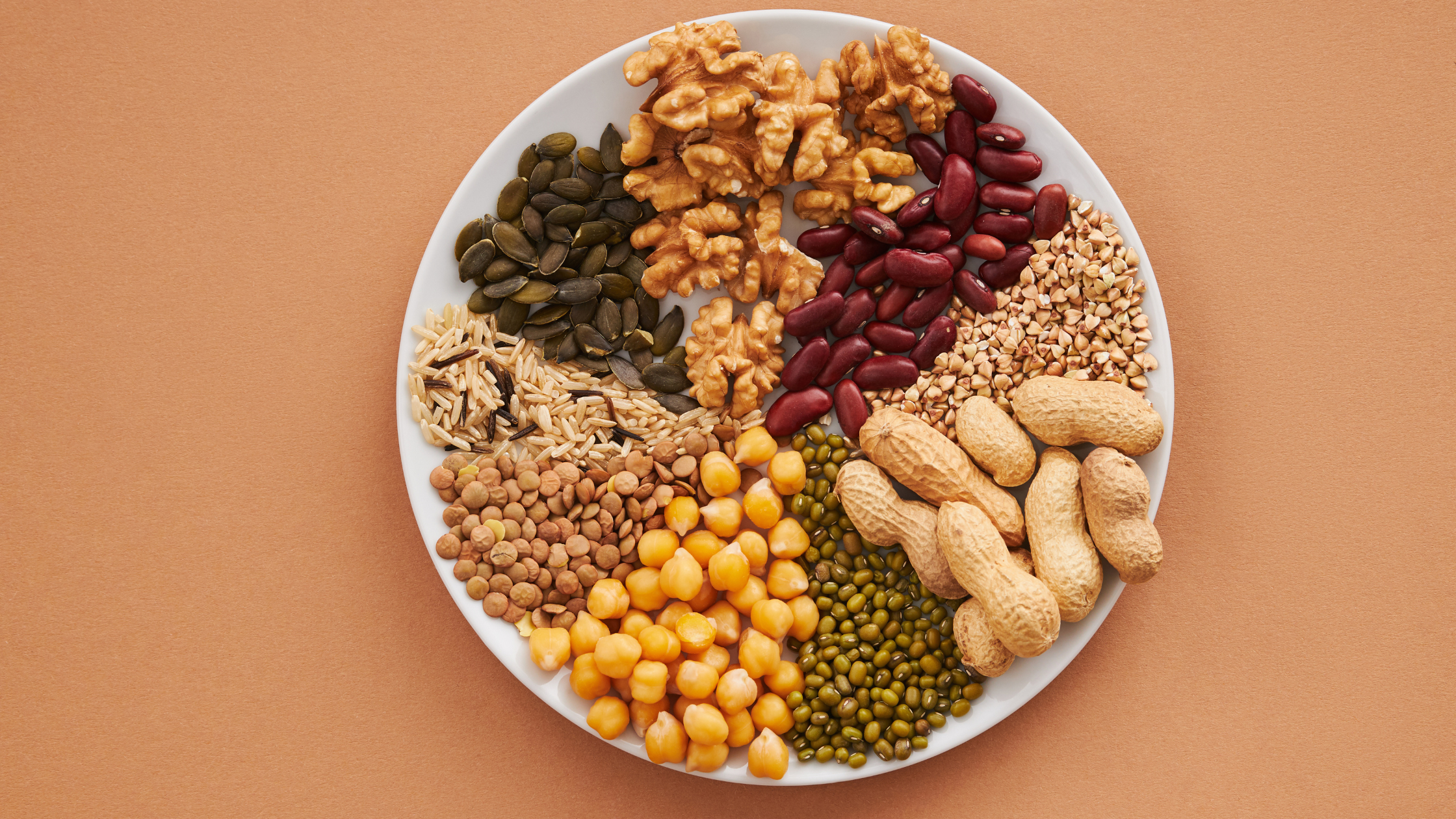Incorporating nuts and seeds into your diet is a simple yet highly effective way to boost your overall well-being. These nutrient-rich powerhouses are loaded with heart-healthy fats, plant-based protein, and vital vitamins and minerals that support various aspects of health, from brain function to digestive health. Just a handful of walnuts can help lower cholesterol, while chia seeds provide a quick fiber boost to keep your gut happy. Whether you want more energy or to reduce the risk of chronic diseases, nuts and seeds offer a flavorful, versatile solution to your lunchbox.
The ABCs of nuts and seeds
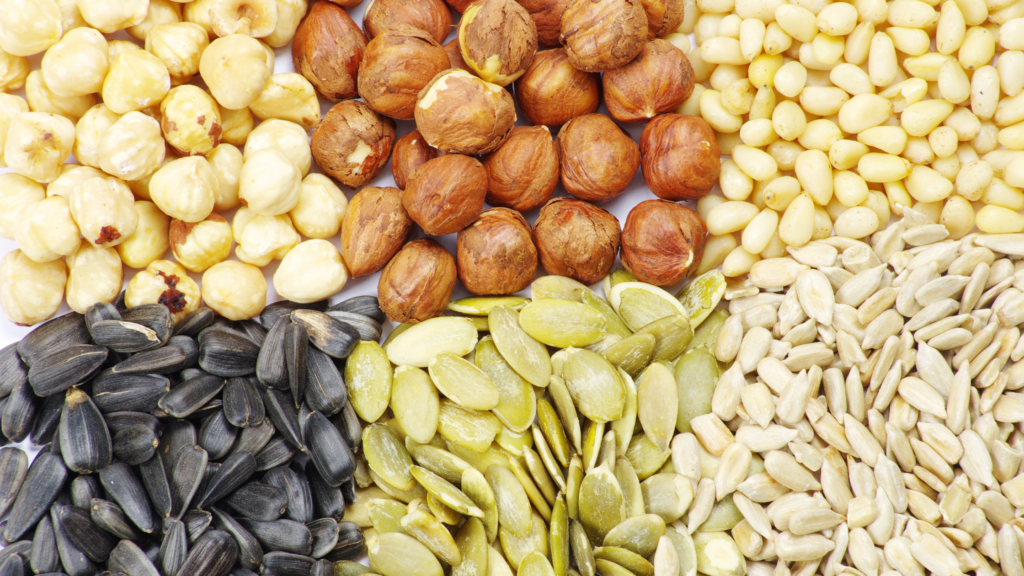
Here’s a list of some of the most nutritious nuts and seeds you should keep on hand. Store them in the fridge or freezer to maximize their freshness and nutritional value.
Almonds: Known for their mildly sweet flavor and crunch, almonds are a versatile ingredient in everything from salads to desserts. They’re packed with vitamin E, a potent antioxidant that helps protect your skin and support immune function. Almonds are also a good source of healthy fats and magnesium, which are crucial for heart health, muscle function, and sleep.
Brazil nuts: Brazil nuts grow in the Amazon rainforest and are especially rich in selenium, a mineral that supports thyroid function, reduces inflammation, and boosts immunity. For men, selenium is also critical for sexual health. Just one or two Brazil nuts per day can meet your daily selenium requirement. Their creamy texture and mild flavor make them a satisfying snack on their own or a great addition to trail mixes.
Cashews: Cashews have a buttery, rich flavor and are lower in fat than most other nuts. They’re an excellent source of copper, which supports healthy bones and the nervous system. Cashews are also high in antioxidants, which can help reduce oxidative stress and protect against chronic diseases. Due to their texture, they’re commonly used in plant-based sauces and creamy spreads.
Chestnuts: Chestnuts stand out from other nuts because they are much higher in carbohydrates and lower in fat. They are often enjoyed roasted and have a naturally sweet flavor. High in vitamin C and antioxidants, chestnuts are a good option for boosting immune health, especially during cold seasons. Their unique nutritional profile makes them a good energy source, especially for people in physically active jobs.
Chia seeds: These tiny seeds are packed with fiber, omega-3 fatty acids, and antioxidants. They form a gel-like consistency when mixed with water, making them a great addition to puddings, smoothies, or as an egg substitute in vegan baking. Due to their rich nutrient content, chia seeds also help improve digestion, reduce inflammation, and support heart health.
Flax seeds: Flax seeds are loaded with omega-3 fatty acids, fiber, and lignans, which are plant compounds that act as antioxidants. To get the full nutritional benefits of flax seeds, they should be ground before consumption. Including them in your diet can help reduce inflammation, improve digestion, and promote heart health.
Hazelnuts: These rich, flavorful nuts are a good source of heart-healthy monounsaturated fats. They are also high in vitamin E and folate, which benefit brain health and reduce the risk of heart disease. Their slightly sweet, buttery taste pairs well with chocolate, making them a popular addition to desserts.
Hemp seeds/hearts: Hemp seeds are incredibly nutrient-dense and contain all nine essential amino acids, making them one of the few complete plant-based proteins. They also provide a good balance of omega-3 and omega-6 fatty acids, making them great for heart and brain health. Sprinkle hemp hearts on salads, yogurt, or smoothies for an extra nutritional boost.
Macadamia nuts: These buttery, crunchy nuts are high in monounsaturated fats, which have been shown to improve cholesterol levels and reduce the risk of heart disease. Macadamias are also a good source of thiamine and manganese, which are vital for energy production and antioxidant function. Their rich flavor makes them a popular ingredient in desserts.
Peanuts: While technically a legume, peanuts are commonly included in the nut family due to their similar nutritional profile. They’re high in protein, making them an excellent option for plant-based diets. Peanuts also contain resveratrol, an antioxidant linked to heart health and reduced inflammation. Enjoy them in peanut butter or roasted for a satisfying snack.
Pecans: Pecans are rich in healthy fats, antioxidants, and minerals like magnesium. They support heart health and may help lower blood pressure. Pecans are also high in dietary fiber, which promotes digestive health. Their naturally sweet buttery taste makes them a popular choice in savory dishes and desserts.
Pine nuts: Often used in pesto, pine nuts have a buttery flavor and are high in magnesium and vitamin K, which support bone health. They also contain pinolenic acid, which can help control appetite and improve blood sugar levels. Pine nuts are packed with nutrients that benefit overall well-being despite their small size.
Pistachios: These small green nuts are delicious and one of the lowest-calorie nuts. They’re rich in potassium, fiber, and antioxidants, making them a great choice for heart health and digestion. Pistachios are also full of lutein, a compound that supports eye health. Their vibrant color and flavor make them a fun addition to meals.
Pumpkin seeds: Also known as pepitas, pumpkin seeds are packed with magnesium, iron, zinc, and healthy fats. These nutrients are important in energy production, immune function, and muscle health. They’re easy to sprinkle on salads, yogurt, or eat as a snack for a quick energy boost.
Sesame seeds: Sesame seeds are rich in calcium, iron, and lignans, compounds that may help lower cholesterol. These tiny seeds are often sprinkled on top of baked goods and stir-fries. Their nutty flavor adds depth to dishes, while their nutrients support heart health and bone density.
Sunflower seeds: Sunflower seeds are an excellent source of vitamin E, magnesium, and selenium, contributing to heart health and immune function. They’re often eaten roasted as a snack or added to salads for a crunchy texture. Sunflower seeds are also high in healthy fats, which support overall well-being.
Walnuts: Walnuts are one of the best plant-based sources of omega-3 fatty acids, which are essential for brain health and reducing inflammation. They’re also rich in antioxidants that help fight oxidative stress. Regular consumption of walnuts has been linked to improved heart health and cognitive function.
| Nut/seed | Vitamins & minerals | Health benefits |
| Almonds | Vitamin B2 (riboflavin), vitamin E, magnesium | Protects skin, supports immune function, heart health, and muscle function |
| Brazil nuts | Vitamin B1 (thiamine), selenium | Supports thyroid function, reduces inflammation, boosts immunity |
| Cashews | Copper, manganese | Supports bones and nervous system, reduces oxidative stress |
| Chestnuts | Vitamin C, antioxidants | Boosts immune health, provides energy |
| Chia seeds | Fiber, omega-3 fatty acids, antioxidants | Improves digestion, reduces inflammation, supports heart health |
| Flax seeds | Omega-3 fatty acids, fiber, lignans | Reduces inflammation, improves digestion, promotes heart health |
| Hazelnuts | Monounsaturated fats, vitamin E, folate | Supports brain health, reduces heart disease risk |
| Hemp seeds | Complete protein, omega-3 & omega-6 fatty acids | Supports heart and brain health |
| Macadamia nuts | Monounsaturated fats, thiamine, manganese | Improves cholesterol levels, supports energy production, and antioxidant function |
| Peanuts | Protein, resveratrol | Supports heart health, reduces inflammation |
| Pecans | Healthy fats, antioxidants, magnesium, vitamin B1 (thiamine) | Supports heart health, lowers blood pressure, promotes digestive health |
| Pine nuts | Magnesium, vitamin K | Supports bone health, controls appetite, improves blood sugar levels |
| Pistachios | Potassium, fiber, antioxidants, lutein | Supports heart health, improves digestion, supports eye health |
| Pumpkin seeds | Magnesium, iron, zinc, healthy fats | Supports energy production, immune function, muscle health |
| Sesame seeds | Calcium, iron, lignans | Lowers cholesterol, supports heart health, and bone density |
| Sunflower seeds | Vitamin E, magnesium, selenium | Supports heart health, and immune function |
| Walnuts | Omega-3 fatty acids, antioxidants | Supports brain health, reduces inflammation, improves heart health |
Nutritional benefits of nuts and seeds
Nuts and seeds provide a powerful punch of nutrients in a small serving. While they are energy-dense and contain calories (that’s why they’re such a great snack on the job!), they also deliver essential nutrients for your overall health and well-being. Here’s a closer look at the nutritional benefits they offer:
Proteins
Nuts and seeds are an excellent source of plant-based protein, making them a great option for vegetarians and vegans. Protein is crucial for muscle repair, tissue health, and maintaining a robust immune system.
For example, one ounce of almonds provides around 6 grams of protein, while three tablespoons of hemp seeds pack 10 grams of protein. Including a variety of nuts and seeds in your diet can ensure you meet your protein needs without relying on animal products.
Carbs (minimal for most)
Most nuts and seeds are low in carbohydrates, which makes them a great choice for people following low-carb or ketogenic diets. The carbohydrates in nuts, such as those in chestnuts or cashews, are usually complex carbs, which provide a steady energy source. This makes them beneficial for people in physical jobs who need sustained energy throughout the day.
Healthy fats
Nuts and seeds are rich in healthy fats, particularly unsaturated fats, which benefit heart health. These fats help lower bad cholesterol (LDL) while increasing good cholesterol (HDL). Omega-3 and omega-6 fatty acids are key components of nuts like walnuts and flax seeds. Omega-3s, in particular, are essential for brain function, reducing inflammation, and supporting overall cardiovascular health.
Incorporating these healthy fats into your diet can help improve cholesterol levels, reduce inflammation, and support cognitive health.
Fiber
Nuts and seeds are a great source of dietary fiber, which is essential for maintaining a healthy digestive system. Fiber helps promote regular bowel movements, supports gut health, and can reduce the risk of heart disease.
For instance, chia seeds contain around 10 grams of fiber per ounce, making them an excellent choice for boosting your daily intake. Including fiber-rich foods like nuts and seeds in your diet can also help with weight management by promoting feelings of fullness.
Vitamins and minerals
Nuts and seeds are loaded with vitamins and minerals essential for overall health. Many varieties, such as almonds and sunflower seeds, are rich in vitamin E, which is known for its antioxidant properties that help protect the skin and support immune function.
Magnesium, found in cashews, pumpkin seeds, and almonds, is essential for bone health, energy production, and muscle function. Nuts like pecans and walnuts also contain zinc, which supports immune function, wound healing, and men’s sexual health.
Health benefits of consuming nuts and seeds
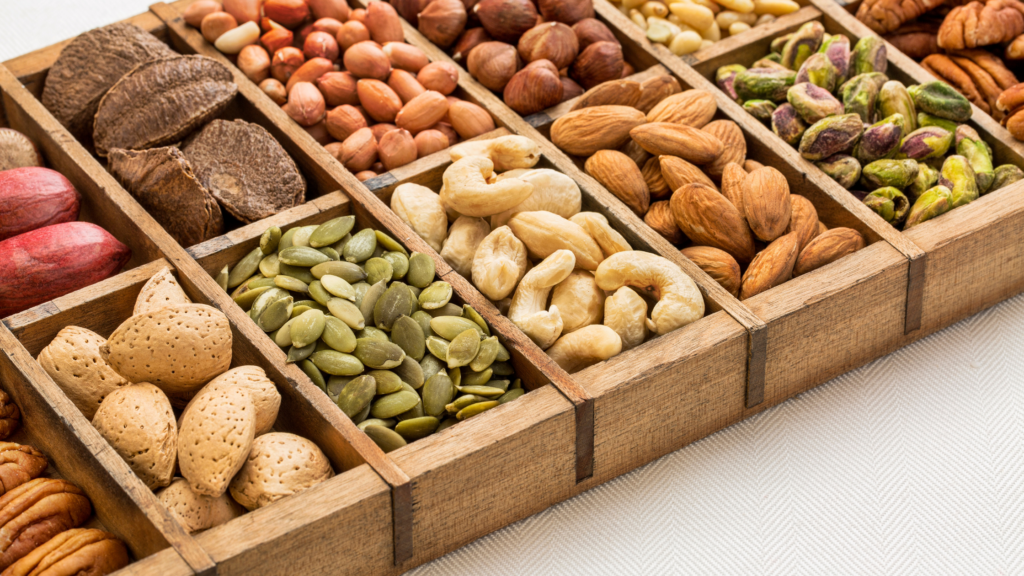
1. Nutrient bombs
Nuts and seeds are small, but they pack an impressive nutritional punch. Even a small serving delivers a wealth of essential nutrients like protein, healthy fats, fiber, and vitamins. This makes them ideal for anyone looking to maximize their nutrient intake without consuming large quantities of food. Including a variety of nuts and seeds in your meals and snacks can help ensure you’re meeting your daily nutritional needs with minimal effort.
2. Reduce the risk of chronic diseases
Research has shown that regular consumption of nuts and seeds can reduce the risk of chronic diseases such as heart disease, type 2 diabetes, and certain cancers—highly prevalent diseases within the AEC industry. This is primarily due to their high content of healthy fats, fiber, antioxidants, and other nutrients that promote overall health.
Studies suggest that individuals who incorporate nuts into their diets are less likely to suffer from cardiovascular problems, thanks to their ability to lower LDL cholesterol levels and reduce inflammation. Seeds, like flax and chia, are particularly beneficial for heart health due to their high omega-3 fatty acid content. Regularly consuming these nutrient-dense foods can significantly reduce the risk of chronic illnesses.
3. Increase longevity
Nuts and seeds are beneficial in preventing diseases and promoting a longer life. Research indicates that people who regularly consume nuts tend to live longer due to their heart-protective properties, ability to regulate blood pressure, and role in maintaining a healthy weight.
One large-scale study observed that individuals who ate nuts daily had a significantly lower risk of mortality, particularly from cardiovascular causes. Their ability to reduce oxidative stress and improve metabolic health means they help protect against age-related conditions, supporting overall longevity.
4. Source of antioxidants
Nuts and seeds are excellent sources of antioxidants, which are vital in protecting the body from oxidative stress and free radical damage. Almonds, walnuts, and hazelnuts are particularly rich in vitamin E, an antioxidant that supports immune function and skin health.
Antioxidants help reduce the risk of chronic diseases by neutralizing harmful free radicals in the body, which can otherwise lead to cell damage and inflammation. Incorporating antioxidant-rich nuts and seeds into your diet can support your body’s natural defenses and promote overall wellness.
5. Reduce cholesterol
One of the most well-known benefits of nuts and seeds is their ability to improve cholesterol levels. They are rich in monounsaturated and polyunsaturated fats, which can help lower LDL (bad) cholesterol and increase HDL (good) cholesterol.
For example, studies have shown that consuming walnuts regularly can lower total cholesterol levels and improve blood vessel function. Pistachios have also been linked to improved lipid profiles, helping reduce cholesterol levels and lowering heart disease risk. Including nuts and seeds in your daily routine effectively maintains healthy cholesterol levels and supports cardiovascular health.
Raw or roasted?
When it comes to choosing between raw and roasted nuts, there are some important considerations to keep in mind. Raw nuts are often preferred because they retain their full nutritional profile, including heat-sensitive nutrients like specific vitamins and antioxidants.
Roasting nuts can sometimes lead to the oxidation of fats, which may reduce their health benefits. In addition, many commercially roasted nuts are prepared with unhealthy oils or excess salt, which can detract from their overall nutritional value.
If you prefer roasted nuts, it’s best to roast them yourself at home at a low temperature to preserve their essential nutrients and avoid harmful additives and fats.
Healthy nut and seed recipes
Incorporating nuts and seeds into your daily meals doesn’t have to be complicated. Here are some easy and delicious ways to enjoy them:
Granola or granola bars
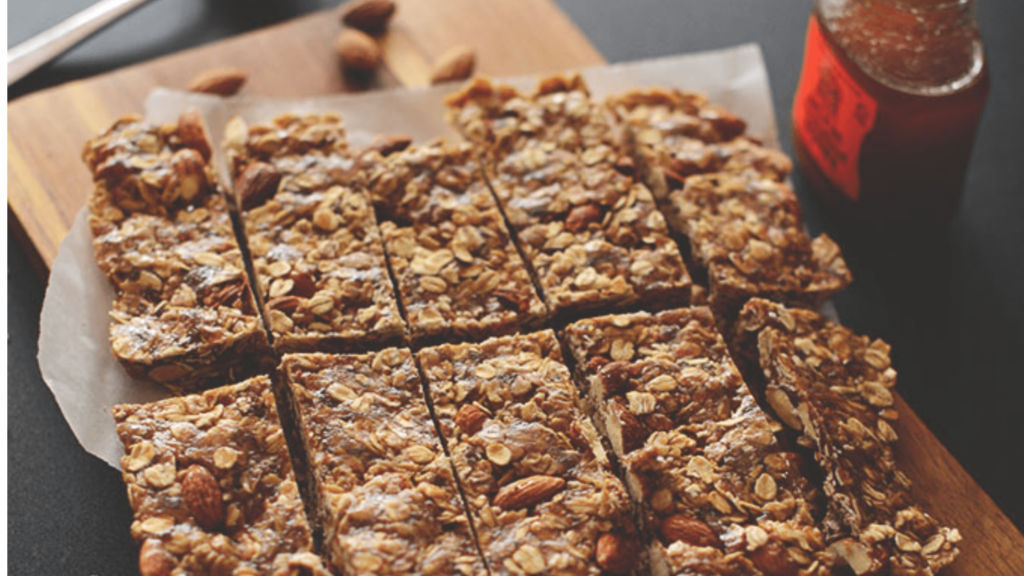
Combine oats, nuts, seeds, honey, and dried fruit to create homemade granola or granola bars. This is a great way to get a mix of healthy fats, protein, and fiber in one satisfying snack. Try this 5-Ingredient Granola Bar recipe from the Minimalist Baker!
Trail mix
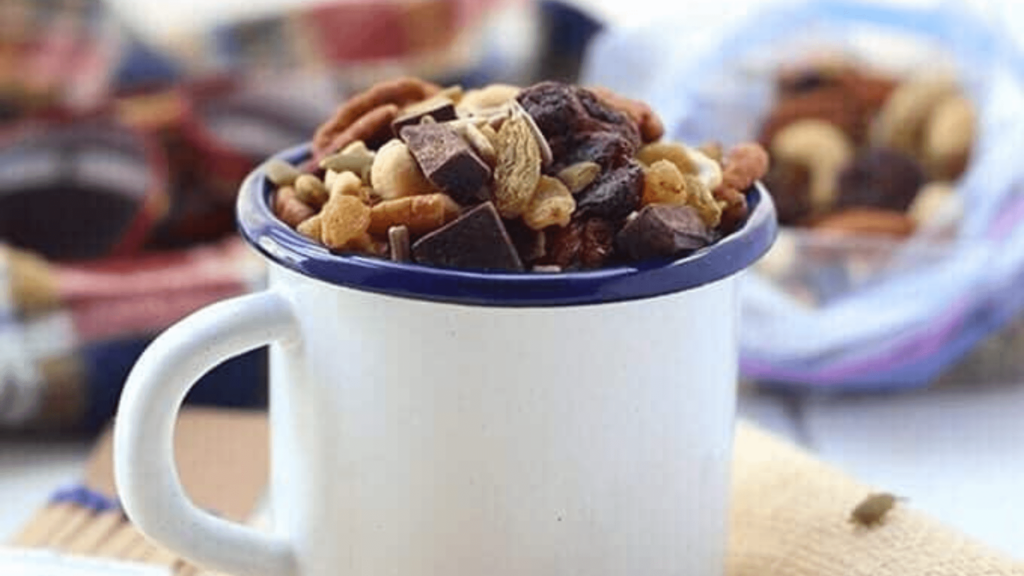
Make your own trail mix by combining a variety of nuts, seeds, and dried fruit for a quick, energy-packed snack you can take on the go. Add a handful of dark chocolate chips for an extra treat. The Healthy Maven explains how to build your own healthy trail mix.
Breading or recipe toppings

Ground nuts like almonds or cashews make a crunchy, nutritious breading for chicken or fish. For added texture and flavor, you can also sprinkle sesame or sunflower seeds on salads, stir-fries, or baked goods. This Nut and Seed Chicken recipe from The Girl With The Iron Cast uses healthy macadamia nuts and sunflower seeds as a delicious coating for chicken.
Bottom line
Nuts and seeds are versatile nutritional powerhouses that provide a wealth of health benefits in every serving. They’re loaded with essential nutrients like healthy fats, protein, fiber, vitamins, and minerals that support everything from heart health to brain function. Whether you enjoy them raw or roasted, adding a variety of nuts and seeds to your diet can help reduce the risk of chronic diseases, improve longevity, and support overall well-being. Plus, they’re ultra-portable, making them an easy add to your work pant pocket!
Don’t be afraid to get creative with incorporating them into your meals—whether it’s through snacks, toppings, or homemade recipes, nuts and seeds can boost your health in many ways.
Like this post? Subscribe to our weekly newsletter and stay updated on the latest health and wellness news for professionals in the AEC space.
